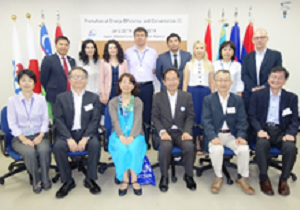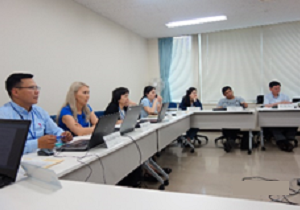
Implementation of JICA group and region-focused training “Promotion of Energy Efficiency and Conservation (C)” on June 2019
<Training in Japan>
Under the instruction and financial support of the Japan International Cooperation Agency (JICA), the Energy Conservation Center, Japan (ECCJ) implemented a training program which provided guidance in Japanese energy conservation activities to seven trainees consisting of government officials from Commonwealth of Independent States (CIS) between June 3 and June 28, 2019.
[Objective]
By attending lectures, practical training, and making site visits related to Japanese energy conservation policies and technologies, the training participants will become aware of the issues facing their organizations, and will create action plans for disseminating energy conservation which are based on actual circumstances.
[Outcome]
1. Through creating and presenting their country reports, trainees could gain an understanding of the energy circumstances and energy conservation policies in their own countries and could explain about their country’s problems.
2. Trainees could gain an understanding of Japanese energy conservation policies, Energy Conservation Act, and energy efficiency promotion activities. They could compare these with their own country’s energy conservation introduction situation and investigate the possibility of applying them in their own countries.
3. Through making site visits to energy conservation excellent case examples in Japan, trainees could gain an understanding of these actually implemented specific energy conservation measures and their effects and benefits. They could compare these with the situation in their own country’s factories and other establishments to determine the differences and investigate the possibility of applying the measures in their own countries.
4. Trainees developed action plans for the organizations that they belong to, which included the application of systems that they had learned about through the lectures and technologies that had been applied during the site visits and practical training.


[Configuration of the training program]
(1) Lectures: Necessity to implement energy conservation, energy conservation policies, Energy Conservation Act and Japanese energy efficiency activities, systems and methods, and basic energy management systems
Exchanges of information related to heat supply facilities in Japan and in the trainee’s own country, and investigations into improvement measures.
(2) Site visits: Trainees made visits to inspect factory, building, and household energy-related locations.
(3) Presentations: Issues related to the promotion of energy conservation in the trainee’s own country (country reports), and promotion of energy conservation measures (action plans)
[Conclusions]
- Through creating their country reports, the trainees classified the issues relating to energy conservation in their own countries, and in the group work activities afterwards the trainees organized the progress of energy conservation policies in the trainees’ own countries and created improvement proposals based on these results.
- It is believed that the experiences gained during the training have given the trainees a good opportunity to acquire extremely practical knowledge when compared with the actual circumstances in the trainees’ own countries.
- In the presentations of the action plans which concluded this training, enthusiastic statements were made by trainees.

